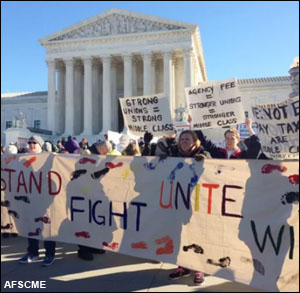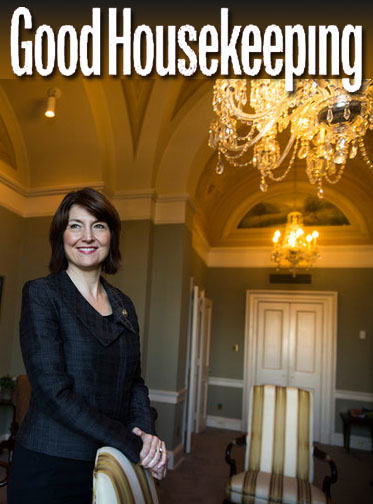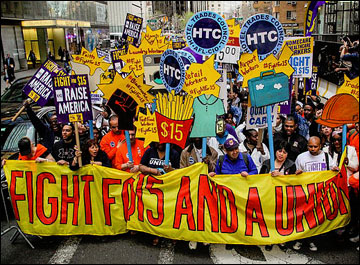NEWS ROUNDUP
Friedrichs fails, SuperDelegates, Cathy keeps House…
Tuesday, March 29, 2016
BREAKING NEWS
 ► From Reuters — Split U.S. Supreme Court rejects conservative challenge to union fees — The U.S. Supreme Court on Tuesday split 4-4 on a conservative legal challenge to a vital source of funds for organized labor, affirming a lower-court ruling that allowed California to force non-union workers to pay fees to public-employee unions. The court, shorthanded after the Feb. 13 death of conservative Justice Antonin Scalia and evenly divided with four liberal and four conservative members, left intact a 1977 legal precedent that allowed such fees. The 4-4 decision in Friedrichs v. California Teachers Association leaves in place an appeals court ruling in favor of the unions but sets no new precedent.
► From Reuters — Split U.S. Supreme Court rejects conservative challenge to union fees — The U.S. Supreme Court on Tuesday split 4-4 on a conservative legal challenge to a vital source of funds for organized labor, affirming a lower-court ruling that allowed California to force non-union workers to pay fees to public-employee unions. The court, shorthanded after the Feb. 13 death of conservative Justice Antonin Scalia and evenly divided with four liberal and four conservative members, left intact a 1977 legal precedent that allowed such fees. The 4-4 decision in Friedrichs v. California Teachers Association leaves in place an appeals court ruling in favor of the unions but sets no new precedent.
EDITOR’S NOTE — Jeff Johnson, President of the Washington State Labor Council, AFL-CIO, released this statement in reaction to this morning’s news:
“Given the 4-4 decision in Friedrichs, longstanding law remains in place. Since the Abood decision in 1977, workers not wanting to join the union have paid fair share fees to cover the cost of the union bargaining and administering contracts that protect all workers under the contract. This was fair then, and remains fair. The silver lining of the Friedrichs threat is that we are more proactively reaching out to our members to talk about the union, and as result, are making our unions and the labor movement stronger.”
STATE GOVERNMENT
► From AP — Lawmakers appear close to conclusion of special session — House Democrats and Senate Republicans announced Monday they’ve reached a deal on the supplemental budget and will vote on it Tuesday, as lawmakers move closer toward a conclusion of their overtime special session.
► From AP — Senate overrides governor’s vetoes — The Senate voted to pass 27 bills with enough support to override vetoes by Gov. Jay Inslee, who struck down the measures when a supplemental budget deal wasn’t reached before the end of the 60-day legislative session in early March. The House will now consider whether to override the vetoed bills too.
 ► In today’s NY Times — A modern system of debtors’ prisons (editorial) — Court systems commonly raise revenue by punishing people who commit minor offenses with fines, fees and penalties that can pile up, driving them into poverty. Worse still, state and local governments often jail people illegally for nonpayment, putting them at risk of losing their jobs and homes.
► In today’s NY Times — A modern system of debtors’ prisons (editorial) — Court systems commonly raise revenue by punishing people who commit minor offenses with fines, fees and penalties that can pile up, driving them into poverty. Worse still, state and local governments often jail people illegally for nonpayment, putting them at risk of losing their jobs and homes.
EDITOR’S NOTE — A bill to reform Legal Financial Obligations and discourage this practice in Washington state passed the House unanimously this year, but Senate Republican leaders refused to allow a vote on it. Shameful.
► In today’s Olympian — Tumwater teachers’ dispute should be with Legislature (by Bill Keim) — The ultimate solution for this problem isn’t to be found in the Tumwater School District offices. The solution, according to our state Supreme Court, lies with the Legislature. And thus far, lawmakers haven’t demonstrated the will to address the problem. How much more local chaos must be created before legislators will begin to meet their paramount constitutional obligation?
LOCAL
► In today’s Columbian — Battle Ground school board OKs teacher contract — The school board’s approval is the last step in approving the agreement. The new two-year contract is retroactive to Sept. 1, 2015.
CAMPAIGN 2016
 ► From The Hill — Sanders pressures Clinton superdelegates to jump ship — While he has won over a few undecided superdelegates over the past few days, there’s no public evidence that Clinton superdelegates, most of whom lined up for her months ago, plan to defect from the front-runner. That includes delegates who are in states that Sanders won, sometimes handily.
► From The Hill — Sanders pressures Clinton superdelegates to jump ship — While he has won over a few undecided superdelegates over the past few days, there’s no public evidence that Clinton superdelegates, most of whom lined up for her months ago, plan to defect from the front-runner. That includes delegates who are in states that Sanders won, sometimes handily.
EDITOR’S NOTE — In Washington state, the superdelegates include Gov. Jay Inslee, U.S. Sen. Maria Cantwell, and U.S. Reps. Jim McDermott, Suzan DelBene, Rick Larsen, Adam Smith, Denny Heck, and Derek Kilmer, who have all publicly backed Clinton.
► From The Hill — Poll: Sanders closes gap nationally — The NBC News/SurveyMonkey online tracking poll found that Clinton leads Sanders by 6 points, 49 percent to 43 percent, following the Vermont senator’s trio of victories over the weekend.
► From The Hill — Trump holds 21-point lead in new national poll
FEDERAL GOVERNMENT
 ► In today’s NY Times — Tired of being defined by others, GOP women speak for themselves — Acutely aware that the Democrats will most likely have a woman at the top of their ticket in 2016, Rep. Cathy McMorris Rodgers (R-Wash.) and some of her female colleagues undertook an ambitious campaign. They decided to reach out to women via women’s magazines and new media, hoping to connect with them in grocery store aisles and through popular online forums.
► In today’s NY Times — Tired of being defined by others, GOP women speak for themselves — Acutely aware that the Democrats will most likely have a woman at the top of their ticket in 2016, Rep. Cathy McMorris Rodgers (R-Wash.) and some of her female colleagues undertook an ambitious campaign. They decided to reach out to women via women’s magazines and new media, hoping to connect with them in grocery store aisles and through popular online forums.
► In today’s Washington Post — Congress needs to give flight attendants a break (by Fredrick Kunkle) — The U.S. government could perhaps make the nation’s commercial airways healthier, saner and maybe even safer with a relatively simple step: ensure that flight attendants get enough sleep. It might even strike a blow for gender equality, too.
NATIONAL
► From Huffington Post — Here’s how a $15 minimum wage could change California — Higher wages in California alone could boost a lot of people: Almost 18 million individuals are employed in the country’s largest state economy, and 118,000 of them make the minimum wage or less. Further, unlike federal law, California law does not permit employers to pay tipped workers a lower minimum wage. That means a hike to $15 would apply to the state’s tipped workers as well.
ALSO at The Stand — California workers win ‘tremendous victory’ in fight for $15 (statement by WSLC President Jeff Johnson)
 ► In today’s Washington Post — California looks to set a $15 an hour minimum wage, raising the floor while others add ceilings — California lawmakers are poised to raise the minimum wage statewide to $15 an hour by 2022, becoming the first state to meet a target that over the past few years has gone from a pie-in-the-sky activist demand to the new baseline for big cities. In most states in the U.S., however, the story is very different. Instead of raising the floor for wages and working conditions, a growing number of states have been creating ceilings — preventing increasingly active cities and towns from going above the state level maximum.
► In today’s Washington Post — California looks to set a $15 an hour minimum wage, raising the floor while others add ceilings — California lawmakers are poised to raise the minimum wage statewide to $15 an hour by 2022, becoming the first state to meet a target that over the past few years has gone from a pie-in-the-sky activist demand to the new baseline for big cities. In most states in the U.S., however, the story is very different. Instead of raising the floor for wages and working conditions, a growing number of states have been creating ceilings — preventing increasingly active cities and towns from going above the state level maximum.
► From Fast Company — Why a new generation of on-demand businesses rejected the Uber model — While the first generation of “on-demand” companies had a business model similar to the one made famous by Uber, many new service-sector startups are instead launching, or pivoting toward, a philosophy closer to that of traditional employers.
► From Quartz — There is no Uber economy, there is only Uber — New data will be crucial for policymakers who are increasingly being asked to change laws and regulations in an effort to accommodate popular new services such as Uber. Last year, 22 states passed laws to protect and legitimize ride-hailing, in a series of victories for Uber. The buzz has even reached Washington, where politicians right now are considering ways to revamp age-old labor policies that would accommodate gig work. Based on this new research, that might just mean accommodating Uber.
The Stand posts links to Washington state and national news of interest every weekday morning by 10 a.m.





